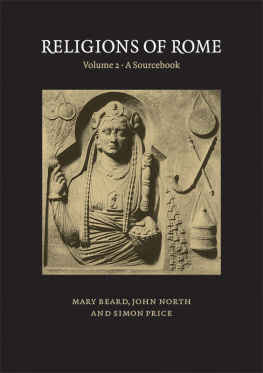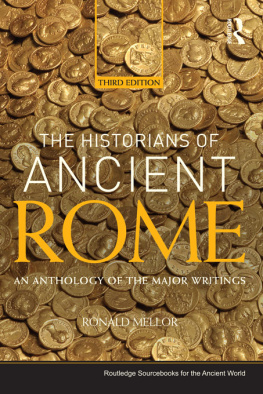DIO'S ROME
AN
HISTORICAL NARRATIVE ORIGINALLY COMPOSED IN GREEK
DURING THE REIGNS OF SEPTIMIUS SEVERUS, GETA
AND CARACALLA, MACRINUS, ELAGABALUS
AND ALEXANDER SEVERUS:
AND
NOW PRESENTED IN ENGLISH FORM
BY
HERBERT BALDWIN FOSTER, A.B. (Harvard), Ph. D. (Johns Hopkins), Acting
Professor of Greek in Lehigh University
FOURTH VOLUME
Extant Books 52-60 (B.C. 29-A.D. 54).
1905
PAFRAETS BOOK COMPANY TROY NEW YOKK
VOLUME CONTENTS
Book Fifty-two Book Fifty-three Book Fifty-four Book Fifty-five Book Fifty-six Book Fifty-seven Book Fifty-eight Book Fifty-nine Book Sixty
DIO'S ROMAN HISTORY
VOL. 4-1
The following is contained in the Fifty-second of Dio's Rome:
How Csar formed a plan to lay aside his sovereignty (chapters 1-40).
How he began to be called emperor (chapters 41-43).
Duration of time, the remainder of the consulship of Csar (5th) and
Sextus Apuleius. (B.C. 29 = a. u. 725.)
(BOOK 52, BOISSEVAIN)
[-1-] My record has so far stated what the Romans both did and endured for seven hundred and twenty-five years under the monarchy, as a democracy, and beneath the rule of a few. After this they reverted to nothing more nor less than a state of monarchy again, although Csar had a plan to lay down his arms and entrust affairs to the senate and the populace. He held a consultation on the subject with Agrippa and Mcenas, to whom he communicated all his secrets. Agrippa, first of the two, answered him as follows:
[-2-] "Be not surprised, Csar, if I try to turn your mind away from monarchy, in spite of the fact that I might enjoy many advantages from it if you held the place. If it were going to prove serviceable to you, I should be thoroughly enthusiastic for it. But those who hold supreme power are not in a like position with their friends: the latter without incurring jealousy or danger reap all the benefits they please, whereas jealousies and dangers are the lot of the former. I have thought it right, as in other cases, to look forward not for my own interest but for yours and the public's. Let us consider leisurely all the features of the system of government and turn whichever way our reflection may direct us. For it will not be asserted that we ought to choose it under any and all circumstances, even if it be not advantageous. Otherwise we shall seem to have been unable to bear good fortune and to have gone mad through our successes, or else to have been aiming at it long since, to have used our father and our devotion to him as a mere screen, to have put "the people and the senate" forward as an excuse. Our object will seem to have been not to free them from conspirators but to enslave them to ourselves. Either supposition entails censure. Who would not be indignant to see that we had spoken words of one tenor, but to ascertain that we had had something different in mind? How much more would he hate us now than if we had at the outset laid bare our desires and aimed straight at the monarchy! It has come to be generally believed that to adopt some violent course belongs somehow to the nature of man, even if it involves taking an unfair advantage. Every person who excels in any business thinks it right that he should enjoy more advantages than his inferior. If he meets with a success he ascribes it to the force of his individual temperament, and if he fails in anything he refers it to the workings of the supernatural. A man, however, who tries to gain advancement by plots and injuries is in the first place held to be crafty and crooked, malicious and vicious: (and this I know you would allow no one to say or think about you, even if you might rule the whole world by it): again, if he succeeds, he is thought to have gained an unjust advantage, and if he fails, to have met with merited misfortune. [-3-] This being so, any one might reproach us quite as much, even if we had nothing of the sort in mind at the beginning and were to begin to devise it only now. For to let the situation get the better of us and not restrain ourselves and not make a right use of the gifts of Fortune is much worse than for a man to do wrong through ill-luck. The latter sort are often compelled by their very disasters and in consideration of their own need of profit to behave against their will in an irregular way: the others voluntarily abandon self-control even if to do so is contrary to their own interests. And when men neither have any love of simplicity in their souls nor are able to show moderation in regard to the blessings bestowed upon them, how could one expect that they would either rule well over others or behave themselves uprightly in trouble? Let us make our decision on the basis that we are in neither of the classes mentioned and do not desire to act in any way unreasonably, but will choose whatever course after deliberation appears to us best. I shall speak quite frankly, for I could not for my part express myself in any other way, and I am aware that you do not enjoy hearing lies mingled with flattery.
[-4-] "Equality before the law has a pleasant name and its results are a triumph of justice. If you take men who have received the same nature, are of kindred race to one another, have been brought up under the same institutions, have been trained in laws that are alike, and yield in common the service of their bodies and of their minds to the same State, is it not just that they should have all other things, too, in common? Is it not best that they should secure no superior honors except as a result of excellence? Equality of birth strives for equality of possessions, and if it attains it is glad, but if it misses is displeased. And human nature everywhere, because it is sprung from the gods and is to return to the gods, gazes upward and is not content to be ruled forever by the same person, nor will it endure to share in the toils, the dangers, the expenditures, and be deprived of partnership in higher matters. Or, if it is forced to submit to such conditions, it hates the power which has applied coercion and if it obtains an opportunity takes vengeance on what it hates. All men think they ought to rule, and for this reason submit to being ruled in turn. They do not wish to be defrauded, and therefore do not insist on defrauding others. They are pleased with honors bestowed by their peers, and approve the penalties inflicted by their laws. If they conduct their government on these lines, and believe that profits and the opposite shall be shared in common, they wish no harm to happen to any one of the citizens and devoutly hope that all good things may fall to the lot of all of them. If one of them himself possesses any excellence, he makes it known without hesitation, practices it enthusiastically, and exhibits it very gladly: or, if he sees it in another, he readily advances it, is eager to increase it, and honors it most brilliantly. On the other hand if any one deteriorates, everybody hates him. If one meets misfortune, everybody pities him. Each person regards the loss or shame that such cause to be a common detriment to the city.
[-5-] "This is the constitution of democracies. Under tyrannies exactly the opposite conditions are found. It is useless to go at length into all of the details, but the chief feature is that no one is willing to seem to know or possess anything good, because the whole ruling power generally becomes hostile to him in such a case. Every one else takes the tyrant's behavior as a standard of life, and pursues whatever objects he may hope to gain through him by taking advantage of his neighbor while incurring no danger himself. Consequently the majority of the people have an eye only to their own interests and hate all other citizens: they esteem their neighbor's good fortune as a personal loss, and his misfortunes as a personal gain.












